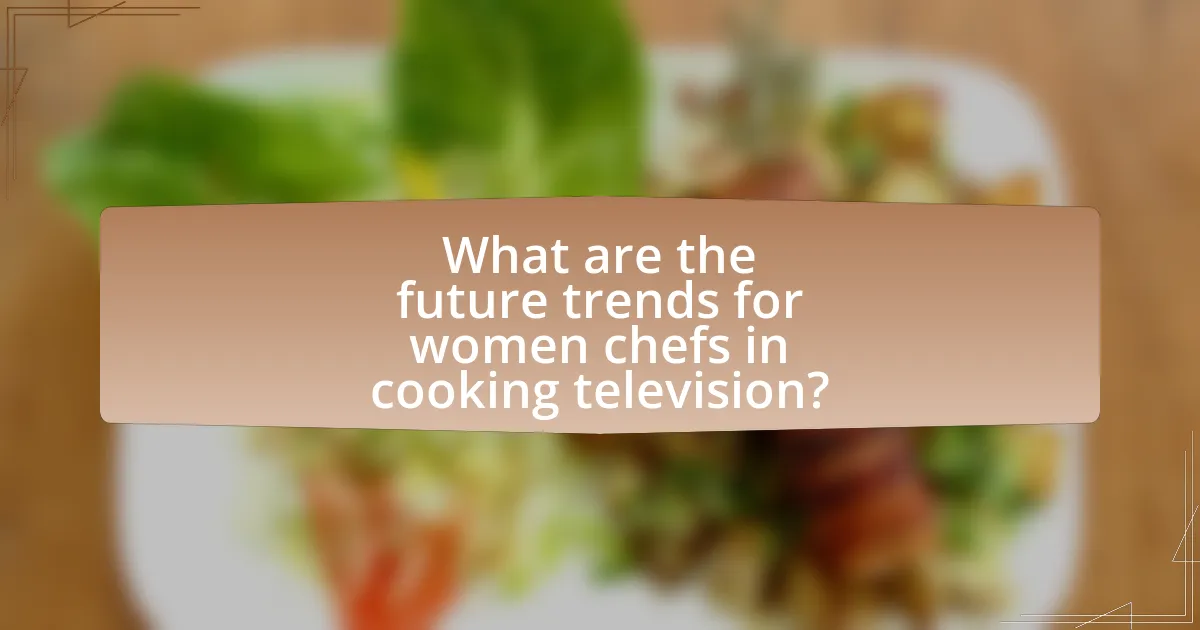The article focuses on the significant contributions of women chefs in cooking television, highlighting their role in reshaping the culinary landscape and challenging gender stereotypes. It discusses the historical challenges women have faced, including gender bias and underrepresentation, while also showcasing notable achievements and the increasing visibility of female chefs in popular cooking shows. The article emphasizes the importance of representation for aspiring female chefs and explores how mentorship, networking, and social media are empowering women in the culinary industry. Additionally, it outlines future trends indicating a rise in female leadership roles and opportunities within cooking television.

What are the contributions of women chefs in cooking television?
Women chefs have significantly shaped cooking television by introducing diverse culinary perspectives and breaking gender stereotypes. They have pioneered popular cooking shows, such as Julia Child’s “The French Chef,” which not only educated audiences about French cuisine but also empowered women in the culinary field. Additionally, chefs like Ina Garten and Rachael Ray have created accessible cooking formats that resonate with home cooks, further expanding the audience for cooking shows. Statistics indicate that women now represent a substantial portion of cooking show hosts, contributing to a more inclusive representation in the culinary arts. Their influence has led to increased visibility for female chefs and has inspired a new generation to pursue careers in cooking and culinary arts.
How have women chefs influenced the culinary landscape on television?
Women chefs have significantly influenced the culinary landscape on television by breaking gender stereotypes and showcasing diverse culinary skills. Prominent figures such as Julia Child, who debuted on television in the 1960s, paved the way for women in cooking shows, demonstrating that women could be authoritative figures in the culinary world. Additionally, chefs like Ina Garten and Rachael Ray have popularized home cooking, making it accessible and relatable to a broader audience. Their success has led to an increase in female representation in cooking competitions and reality shows, with programs like “Top Chef” and “MasterChef” featuring women as both contestants and judges, thereby reshaping the perception of women in the culinary industry. This shift has not only elevated the status of women chefs but has also diversified the types of cuisines and cooking styles presented on television, reflecting a more inclusive culinary narrative.
What notable achievements have women chefs accomplished in cooking shows?
Women chefs have achieved significant milestones in cooking shows, including winning prestigious competitions and gaining recognition for their culinary skills. For instance, in 2013, Chef Christine Ha became the first blind contestant to win “MasterChef,” showcasing her exceptional talent and resilience. Additionally, Chef Melissa King won “Top Chef” in 2019, further highlighting the increasing visibility and success of women in competitive cooking environments. These achievements not only demonstrate the culinary prowess of women chefs but also inspire future generations to pursue careers in the culinary arts.
How do women chefs challenge traditional gender roles in the culinary industry?
Women chefs challenge traditional gender roles in the culinary industry by breaking into leadership positions and redefining culinary excellence. Historically, the culinary field has been male-dominated, with women often relegated to subordinate roles. However, prominent women chefs like Julia Child, Alice Waters, and Dominique Crenn have gained recognition and respect, showcasing their skills and creativity in high-profile kitchens and media platforms. Their success has led to increased visibility for women in culinary arts, inspiring a new generation to pursue careers in cooking and leadership roles. Research indicates that restaurants led by women often demonstrate higher profitability and employee satisfaction, further validating the impact of women chefs in transforming industry norms.
Why is representation of women chefs important in cooking television?
Representation of women chefs in cooking television is important because it challenges gender stereotypes and promotes diversity in the culinary field. By showcasing women in leadership roles, cooking shows can inspire future generations of female chefs and encourage a more inclusive industry. Research indicates that women make up approximately 50% of culinary school graduates, yet they are underrepresented in high-profile cooking shows and leadership positions within restaurants. This disparity highlights the need for increased visibility of women chefs to foster equality and recognition in a traditionally male-dominated space.
What impact does representation have on aspiring female chefs?
Representation significantly impacts aspiring female chefs by providing role models and validating their ambitions in a male-dominated industry. When female chefs are visible in media and culinary competitions, they inspire young women to pursue culinary careers, demonstrating that success is achievable. Research indicates that visibility can enhance self-efficacy among women; for instance, a study published in the Journal of Applied Psychology found that seeing women in leadership roles positively influences women’s career aspirations. This representation not only encourages aspiring chefs but also challenges stereotypes, fostering a more inclusive culinary environment.
How does visibility in media affect public perception of women in cooking?
Visibility in media significantly enhances public perception of women in cooking by showcasing their skills and contributions, thereby challenging traditional gender roles. When women chefs are prominently featured in cooking shows, competitions, and culinary publications, it helps to normalize their presence in a field historically dominated by men. For instance, the rise of female chefs like Julia Child and more recently, chefs such as Dominique Crenn and Ayesha Curry, has led to increased recognition and respect for women in culinary arts. Research indicates that representation in media can influence societal attitudes; a study published in the Journal of Communication found that increased visibility of women in various professions, including cooking, correlates with a more positive public perception and greater acceptance of women in those roles. This visibility not only empowers aspiring female chefs but also encourages a broader audience to appreciate and support women’s contributions to the culinary world.

What barriers have women chefs faced in the cooking television industry?
Women chefs have faced significant barriers in the cooking television industry, including gender bias, lack of representation, and limited access to opportunities. Gender bias manifests in the form of stereotypes that often portray women as less competent than their male counterparts, impacting their credibility and visibility on screen. Additionally, women are underrepresented in cooking shows, with studies indicating that only about 30% of cooking show hosts are female, which limits role models for aspiring women chefs. Furthermore, women often encounter challenges in securing funding and support for their culinary ventures, as evidenced by research from the James Beard Foundation, which highlights that women chefs receive a disproportionately small share of culinary grants and sponsorships compared to men. These barriers collectively hinder the progress and recognition of women in the cooking television industry.
What historical challenges have women chefs encountered in this field?
Women chefs have historically faced significant challenges in the culinary field, including gender discrimination, limited access to professional kitchens, and societal stereotypes regarding women’s roles. For instance, in the early 20th century, women were often relegated to positions such as line cooks or pastry chefs, while men dominated executive chef roles. This disparity was reinforced by cultural beliefs that women were less capable of handling the pressures of high-stakes kitchen environments. Additionally, women chefs have struggled for recognition and respect in a male-dominated industry, often receiving less media coverage and fewer opportunities for advancement compared to their male counterparts. These challenges have persisted over decades, impacting women’s representation and success in culinary arts.
How have societal expectations shaped the careers of women chefs?
Societal expectations have significantly influenced the careers of women chefs by imposing traditional gender roles that often limit their opportunities and recognition in the culinary field. Historically, women have been expected to fulfill domestic roles, which has led to their underrepresentation in professional kitchens and high-profile culinary positions. For instance, a study by the James Beard Foundation in 2019 highlighted that only 7% of head chefs in fine dining restaurants are women, reflecting the impact of societal norms on career advancement. Additionally, women chefs often face challenges such as bias and skepticism regarding their skills, which can hinder their professional growth and visibility in a male-dominated industry. These societal pressures have shaped not only the career trajectories of women chefs but also the public perception of their capabilities and contributions to the culinary arts.
What specific obstacles do women chefs face in gaining recognition?
Women chefs face several specific obstacles in gaining recognition, including gender bias, lack of mentorship, and underrepresentation in leadership roles. Gender bias manifests in the form of stereotypes that question women’s culinary skills and leadership abilities, often leading to fewer opportunities for advancement. The lack of mentorship means that women often do not have access to the guidance and support that can help them navigate the industry effectively. Additionally, underrepresentation in leadership roles, such as executive chef positions, limits visibility and recognition for women in the culinary field. According to a 2019 report by the James Beard Foundation, only 7% of chefs in the U.S. are women, highlighting the systemic barriers that contribute to their struggle for acknowledgment and success.
How are women chefs overcoming these barriers?
Women chefs are overcoming barriers in cooking television by leveraging social media platforms to showcase their culinary skills and build personal brands. This approach allows them to bypass traditional gatekeeping in the industry, gaining visibility and a following that can lead to opportunities in mainstream media. For instance, many women chefs have successfully launched their own cooking shows or secured partnerships with established networks by cultivating a strong online presence. Additionally, initiatives like mentorship programs and female-focused culinary competitions are providing women with the support and resources needed to thrive in a male-dominated field. These strategies are evidenced by the increasing number of women winning prestigious culinary awards and gaining leadership roles in top restaurants and television shows.
What strategies are women chefs using to succeed in cooking television?
Women chefs are succeeding in cooking television by leveraging their unique culinary perspectives, building strong personal brands, and utilizing social media for audience engagement. These strategies allow them to differentiate themselves in a competitive industry. For instance, chefs like Ayesha Curry and Carla Hall have effectively used their personal stories and cultural backgrounds to connect with viewers, enhancing relatability and authenticity. Additionally, women chefs often collaborate with established networks and participate in cooking competitions, which increases their visibility and credibility. Research indicates that women in culinary roles are increasingly gaining recognition, with a 2021 report from the James Beard Foundation highlighting a rise in female nominees for prestigious awards, showcasing their impact and success in the field.
How do mentorship and networking play a role in their success?
Mentorship and networking are crucial for the success of women chefs in cooking television as they provide guidance, support, and opportunities for collaboration. Mentorship allows these chefs to learn from experienced professionals, gaining insights into the industry and developing essential skills. For instance, a study by the James Beard Foundation highlights that women who have mentors are more likely to advance in their careers and achieve leadership roles. Networking, on the other hand, facilitates connections with industry peers, potential collaborators, and influential figures, which can lead to job opportunities and increased visibility. Research indicates that women in culinary fields who actively engage in networking are more likely to secure television appearances and build successful brands. Together, mentorship and networking create a supportive ecosystem that empowers women chefs to break barriers and thrive in the competitive landscape of cooking television.

What are the future trends for women chefs in cooking television?
The future trends for women chefs in cooking television indicate a significant increase in representation and leadership roles. Women chefs are expected to take on more prominent positions as hosts, judges, and culinary influencers, reflecting a broader societal shift towards gender equality in the culinary arts. According to a 2021 report by the James Beard Foundation, women now represent 50% of culinary school graduates, which is likely to translate into more female-led cooking shows and initiatives. Additionally, the rise of social media platforms allows women chefs to build personal brands and reach audiences directly, further enhancing their visibility and impact in the industry.
How is the landscape of cooking television evolving for women chefs?
The landscape of cooking television is evolving positively for women chefs, as they increasingly gain visibility and leadership roles in the industry. Recent data shows that women now represent a significant portion of cooking show hosts and judges, with programs like “Top Chef” and “MasterChef” featuring female chefs prominently. Additionally, the rise of social media platforms has allowed women chefs to showcase their culinary skills and build personal brands, further enhancing their influence in the culinary world. This shift is supported by initiatives aimed at promoting diversity and inclusion within the food industry, leading to a more equitable representation of women in cooking television.
What new opportunities are emerging for women in this industry?
New opportunities for women in the cooking television industry include increased visibility and representation, as well as the rise of platforms that prioritize diverse voices. Women chefs are now more frequently featured as hosts and judges on popular cooking shows, reflecting a shift towards inclusivity. According to a 2022 report by the Culinary Institute of America, women now represent 40% of culinary school graduates, leading to a greater influx of female talent in the industry. Additionally, streaming services are creating original cooking content that showcases women chefs, allowing them to reach wider audiences and build personal brands. This trend is supported by data from the Food Network, which indicates that shows led by women chefs have seen a 30% increase in viewership over the past three years.
How can technology and social media empower women chefs?
Technology and social media empower women chefs by providing platforms for visibility, networking, and skill development. These tools enable women chefs to showcase their culinary creations to a global audience, thereby increasing their reach and influence in the industry. For instance, platforms like Instagram and TikTok allow chefs to share recipes, cooking techniques, and personal stories, fostering a community that supports and promotes their work. Additionally, technology facilitates access to online culinary courses and resources, enhancing their skills and knowledge. According to a study by the International Journal of Gastronomy and Food Science, social media significantly boosts the professional profiles of women chefs, leading to increased opportunities in a traditionally male-dominated field.
What practical steps can aspiring women chefs take to break into cooking television?
Aspiring women chefs can break into cooking television by building a strong personal brand and gaining relevant experience. They should start by honing their culinary skills through formal education or apprenticeships, which can provide foundational knowledge and credibility. Networking within the industry is crucial; attending culinary events, joining professional organizations, and connecting with established chefs can open doors to opportunities.
Creating a social media presence focused on cooking can showcase their skills and personality, attracting attention from producers and audiences alike. Participating in cooking competitions or local food events can also provide visibility and experience. Additionally, aspiring chefs should consider pitching unique show ideas that highlight their culinary perspective, as originality can capture the interest of television networks.
Statistics show that women are underrepresented in cooking television, making it essential for aspiring chefs to leverage their unique stories and perspectives to stand out in a competitive field.
What skills are essential for success in cooking television?
Essential skills for success in cooking television include culinary expertise, communication skills, and adaptability. Culinary expertise ensures that chefs can create appealing and innovative dishes, which is crucial for engaging viewers. Communication skills are vital for effectively conveying recipes and techniques to the audience, making the content accessible and enjoyable. Adaptability allows chefs to handle unexpected challenges, such as time constraints or equipment failures, while maintaining a professional demeanor. These skills are supported by the fact that successful cooking shows often feature hosts who can not only cook well but also connect with their audience, as seen in programs led by prominent chefs like Julia Child and Ina Garten.
How can women chefs build their personal brand in the culinary world?
Women chefs can build their personal brand in the culinary world by leveraging social media platforms to showcase their culinary skills and unique style. By consistently sharing high-quality content, such as recipes, cooking tips, and behind-the-scenes glimpses of their culinary journey, women chefs can engage with a broader audience and establish a loyal following. Research indicates that 70% of consumers are influenced by social media when making food-related decisions, highlighting the importance of an online presence. Additionally, participating in culinary competitions and collaborating with other chefs can enhance visibility and credibility, further solidifying their brand in a competitive industry.










